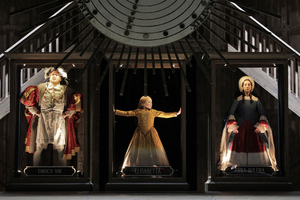Review: ROBERTO DEVEREUX at Dorothy Chandler Pavilion

On Saturday evening February 22, 2020, Los Angeles Opera presented a vocally glorious rendition of Gaetano Donizetti's Bel Canto opera Roberto Devereux. Roberto was one of the loves of England's Elizabeth I, so the opera is centered around their relationship and Roberto's forbidden love for Sara, the wife of the Duke of Nottingham. All of the artists sang tremendously intricate coloratura and they excelled on this occasion. Librettist Salvatore Cammarano wrote the opera's Italian text based on two French plays dealing with the subject and possibly a few stolen glances at Felice Romani's libretto for Saverio Mercadante's 1833 Il Conte d'Essex.
The single set by the late Belgian designer Benoît Dugardyn resembled the Globe Theater of Shakespeare's time with its staircases and many levels. It provided an elegant space for the chorus but its severely raked and somewhat cumbersome main level did little to advance the story line. The curtain, which covered only the center of the stage, seemed to be a brilliant red rug. The audience saw statues of Henry VIII and Anne Boleyn in glass cases along with other symbols of power and death around the stage. In the opera's last scene we saw the elderly Elizabeth at her dressing table, a reminder of the swift flight of youth.
British stage director Stephen Lawless gave a semi-realistic presentation of the historical tale, but it was the music and the singers' renditions of it that added the emotional pull. Ingeborg Berneth's neutral-colored costumes fixed the time and place as 16th century Protestant England. Only Elizabeth wore a bright color, blood red velvet. Christopher Akerlind added depth and significance to various aspects of the stage picture with his lighting design.
Although Davinia Rodriguez was to have sung Elizabeth, due to illness she cancelled her performances a week before the premiere. Angela Meade, who will perform Elizabeth in Roberto Devereux at the Metropolitan Opera in the fall, sang the role from the side of the stage while choreographer Nicola Bowie acted center stage. It worked, although some of Bowie's gestures were more appropriate to ballet than opera. Bowie's choreographed Ladies-in-Waiting moved like a corps de ballet around the queen.
As Elizabeth I, Meade had her work cut out for her but she had the necessary clarion tones and enormous vocal skills, such as trills and flexibility in singing fast complicated runs. She sang many of these decorations in her majestic aria, "Duchessa, alle fervide preci" ("Duchess, to your husband's fervent requests"). Later, in the cavatina "L'amor suo mi fe' beata" ("His love blessed me"), she maintained her intensity while showing a warmer, more lyric side to her talent as her character imagined her love for Roberto was reciprocated.
Roberto Devereux was a tour-de-force for Meade that also showed her strength in ensembles and passages where the gold of her voice glinted above the harmony of Grant Gershon's full chorus. At the end of the opera, Elizabeth wanted to save Roberto, but her courtiers considered him a traitor. They summoned the headsman before she could change his sentence. Elizabeth sang the final aria "Vivi, ingrato" ("Live, ungrateful one") with clarity, precision, and a grand tapestry of vocal color, but it was too late and the queen was left in total devastation by the death of the man she loved.
Ramón Vargas was the tempestuous Roberto, a passionate lover with a warm and sonorous legato. Although he was a traitor to his friends and his country, audience members could not help but feel sorry for him when the executioners took him away. He was most impressive as a prisoner in the haunting final scene during which he intoned his heartfelt thoughts.
As Sara, Duchess of Nottingham, Ashley Dixon was a more than adequate replacement for a British mezzo-soprano who also cancelled. Dixon sang her poignant opening Romanza with radiant beauty of tone and a delightful range of vocal colors. She was an enticing Sara whose dulcet tones also shone brightly in her duets and ensembles with the rest of the cast.
Although Quinn Kelsey was making his LA Opera debut as the replacement for Placido Domingo, many patrons were already familiar with his Verdi roles at other opera companies. He is a consummate artists and his Donizetti was focused with clean, exact coloratura. A fine actor, he convinced the audience that he had become a villain only because he had suffered betrayal.
Domingo-Colburn-Stein Young Artist Program members, tenor Anthony Ciaramitaro and baritone Michael J. Hawk sang with authority as Lord Cecil and Sir Walter Raleigh. As the Page and the Servant of Nottingham, Steve Pence and Abdiel Gonzalez rounded out the cast with their energy and bronzed tones.
Also making her L A Opera debut at this performance was conductor Eun Sun Kim, music director at San Francisco Opera. She gave an energetic reading of the score which brought out the dramatic intensity of the work. She kept the action moving with brisk tempi but always allowed the singers enough room to create sonorous characters. The musical standards for this performance were enormously high thanks to Angela Meade's singing and Nicole Bowie's acting the role of Elizabeth.
Photo by Cory Weaver.
Reader Reviews

Videos

